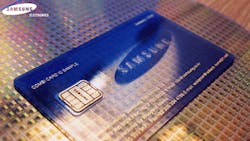Samsung, Philips and Infineon Sued by EU Over Smartcard Chip Cartel
BRUSSELS -- The European Union fined Infineon, Philips and Samsung (IW 1000/14) a total of 138 million euros (US$181 million) on Wednesday for fixing the prices of smartcard chips, in its latest anti-trust case against technology firms.
The German, Dutch and South Korean companies "colluded" between 2003 and 2005 to fix prices on the chips, which are widely used in mobile phones, bank cards and passports, the European Commission said.
Japan's Renesas was granted immunity for revealing the existence of the cartel to the commission, which began its investigation in 2008 with raids on the companies.
Infineon Technologies AG was fined 82.7 million euros, Philips 20.1 million euros, and Samsung 35.1 million euros, with the latter having its penalty reduced by 30% for having cooperated with investigators.
Rejecting the allegations as "unfounded," Infineon said it will review the decision and is "ready to appeal" at the General Court of the European Union in Luxembourg.
The companies "in our view knew that their conduct was illegal," said Joaquin Almunia, the commission's vice president in charge of competition policy.
They "discussed and exchanged sensitive commercial information on pricing, customers, contract negotiations, production capacity or capacity utilization and their future market conduct," the commission said.
Digital Era
Almunia added that "in this digital era smart card chips are used by almost everybody, whether in their mobile phones, bank cards or passports."
Companies producing them should be focused on being competitive, he said, adding: "If instead companies choose to collude, at the expense of both customers and end consumers, they should expect sanctions."
The commission said that Renesas and its joint-venture parent companies Hitachi and Mitsbubishi had avoided a fine of more than 51 million euros because it was the first to reveal the existence of the cartel to the EU.
It said that Philips "remains liable for what happened during the period of infringement" even though it has since divested its smart card chips business.
Anyone harmed by the cartel may seek damages before the courts of the European member states, the commission said.
Infineon said from its base in Neubiberg, Germany that it had conducted its own thorough probe and "concluded that none of its personnel acted improperly in handling competitively sensitive information" about smartcard chips.
The EU has previously fined U.S. computer chip giant Intel 1.06 billion euros for abusing its dominant market position.
Earlier this year Google and the Commission agreed a deal over accusations the world's largest search engine was squeezing out competitors in Europe's search market, so avoiding legal action and potentially billions in fines.
Brussels launched its investigation of Google in November 2010 following a complaint by several companies, including Microsoft.
- Lachlan Carmichael, AFP
Copyright Agence France-Presse, 2014
About the Author
Agence France-Presse
Copyright Agence France-Presse, 2002-2025. AFP text, photos, graphics and logos shall not be reproduced, published, broadcast, rewritten for broadcast or publication or redistributed directly or indirectly in any medium. AFP shall not be held liable for any delays, inaccuracies, errors or omissions in any AFP content, or for any actions taken in consequence.
